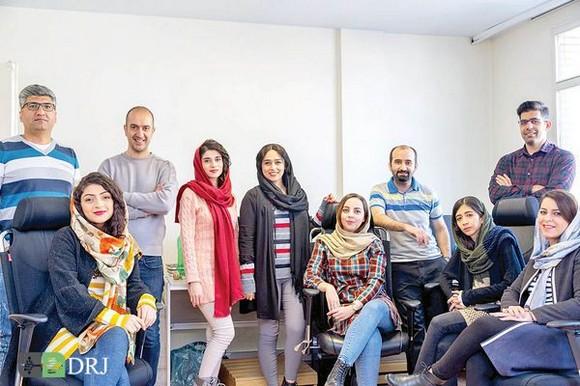Barely six months after inaugurating a tiny software-coding boot camp in a basement in Tokyo, Silicon Valley transplant Kani Munidasa stood before some of Japan‘s top business leaders in February with a warning: software was threatening their future.
A Sri Lankan native with a Japanese mother and wife, Munidasa was speaking at the invitation of Nobuyuki Idei, a former chief executive of Sony Corp.
Idei had offered to become an adviser to the boot camp, called Code Chrysalis, whose mission of bringing Japan‘s software engineering up to global standards and helping its companies transform aligned with his own.
“Idei-san told me, ‘Tell it as it is; don’t sugar-coat anything. They need to hear that change has to happen,'” Munidasa said, recalling how he showed up at the executives’ meeting in a T-shirt and hoodie.
Long known as a “monozukuri” – or manufacturing – powerhouse, Japan is in danger of getting left behind as artificial intelligence, robotics, and machine learning sweep through industries from cars to banking, Idei and others say.Japanese companies have traditionally treated software as a means to cut costs rather than add value, and code-writers as second-class citizens. Entry-level software engineers in Japan make about $40,000 on average – less than half their U.S. counterparts.
Programs like Code Chrysalis are trying to change that by injecting Silicon Valley training methods into Japan‘s slow-to-change corporate culture.
Coding, “soft skills” like public speaking and even physical fitness are all on the agenda. Since Code Chrysalis opened last July, a dozen students have graduated from its 12-week course, with six more in the pipeline. The camp currently accepts up to eight applicants per session.
For the students, the benefits are clear: their salaries increased by an average of nearly 80 percent after graduation, according to Code Chrysalis.
Japanese companies are desperate for skilled developers, with top IT recruiter Computer Futures seeing 2.3 job openings for every applicant so far this year, and most positions being filled by foreigners.
Educators and industry leaders hope programs such as Code Chrysalis will be transformative for Japan.
“Even if the numbers are small, I think (Code Chrysalis) can have a big impact,” Idei told Reuters, noting that Japan had focused too much on “physical goods” in the post-Internet age.
“The United States has Google, Apple, Facebook, Amazon,” said Idei, now CEO of his consultancy, Quantum Leaps. “China’s got Baidu, Alibaba and Tencent.Japan doesn’t have a single platform company. That’s the No. 1 difference.”
A TEXTBOOK PROBLEM
Japan‘s English-language education, notoriously focused on standardized testing, has hindered the development of good programmers, industry insiders say.
Without a good grasp of the language, programmers are always a step behind, waiting for translations to access cutting-edge tools and methods.
Toyota is making English the common language for the 1,000 software engineers it plans to employ at a new automated-driving unit launching in Tokyo next month.
James Kuffner, CEO of the unit, Toyota Research Institute-Advanced Development (TRI-AD), said Japan‘s computer science education was also overly based on textbook learning.
Recalling the “horrible and boring” lectures he sat through at the prestigious University of Tokyo as a post-doctoral research fellow in 1999, Kuffner said the classes did little to prepare students for the real world. Coding boot camps are a step in the right direction, he said.
“I want to figure out a way to fix the education system because it’s also important for our company,” said Kuffner, who still serves as an adjunct associate professor at Carnegie Mellon’s Robotics Institute. “I would love to make a university where (everything) you did was project-based.”
REBOOTING THE SYSTEM
Munidasa and his co-founder, Yan Fan, tailored their course around project-based learning, teaching exclusively in English.
Just one other English-language coding boot camp exists in Japan, run by French chain Le Wagon since late 2016, with 75 graduates so far. That program, which costs 790,000 yen ($7,200) for a nine-week course, targets beginners looking for a job in software development, who want to freelance, or who are launching their own start-ups.
“The positioning is very different because we work with beginners to bring them to a junior-developer level,” said Paul Gaumer, co-founder of Le Wagon Japan.
Munidasa and Fan’s program, which is aimed at higher-level training, has so far rejected nearly 80 percent of applicants, some of whom couldn’t meet the English requirement. To help, they added a four-week English-communication course.
During Code Chrysalis’ 1.03 million yen ($9,390), full-time course, students learn to become “full-stack” engineers, covering servers, user interfaces, and everything in between.
Beyond coding, they get unconventional instruction: voice training from an opera singer, squats challenges, and assignments requiring intense teamwork.
BABY STEPS
Code Chrysalis has already caught the attention of some big Japanese firms, including information technology giant NTT Data.
Its applied software engineering center is using Code Chrysalis for part of its training and has placed an engineer in the current cohort.
“Our customers are increasingly looking for faster and cheaper software development, and we need to be able to meet those demands,” said human resources manager Kotaro Kimura. Masataka Shintoku, an engineer in NTT Data’s sales and planning group who found Code Chrysalis on his own and graduated in March, says he’s already putting his new skills to work.
“I’m now able to create an app on my own and show prospective clients what we can do,” he said.
Kuffner said he hopes to emulate the storied Toyota Production System to create the software world’s “best process for writing bug-free software” as automated cars incorporate millions of lines of code.
“Japanese people are hard-working, very dedicated,” he said. “I have no question in my mind that with the right training they could be some of the best software engineers in the world.”
Also Read:
Tokyo Century acquires 5% stake in Indonesia’s Nobu Bank
Japanese e-commerce giant Rakuten acquires Silicon Valley startup Curbside
Reuters
The post Silicon Valley-style coding boot camp seeks to reboot Japan Inc appeared first on DealStreetAsia.

ایده ها برای استارت آپ موجب رونق کسب و کارهای اینترنتی
آینده / استارت آپ

استارتآپها ادبیات بازار سرمایه را بلدند؟
استارت آپ

صدور تاییدیه دانش بنیانی شتابدهنده صدر فردا
اخبار / استارت آپ

اپلیکیشن شارژاپ
گوناگون / استارت آپ / رپرتاژ آگهی / بازتاب

جذابترین ایدههای B2B در سال 2020
استارت آپ

تعریف استارت آپ startup
دانشنامه / استارت آپ / مقاله

۱۰ استارتاپ که بدون سرمایه به سوددهی رسیدند
استارت آپ

ایده ها و پیشنهاد برای استارت آپ در سال جدید
راهکارها و ترفند ها / استارت آپ

استارتآپ ایرانی؛ مرجع اول زنان افغان
استارت آپ

شروع یک کسب و کار نوپا پلتفرمی
استارت آپ

برنامه شبکه اجتماعی تیندر
گوناگون / معرفی وب سایت / استارت آپ

10 استارت آپ برتر تاکسیرانی جهان
استارت آپ

پخت پیتزاهای هیجان انگیز با هوش مصنوعی
آینده / استارت آپ

ایده های استارتاپی فراموش شده
دورنما / بازار / استارت آپ

اپل، استارتاپ فناوری خودران Drive.ai را تصاحب کرد
استارت آپ

بررسی مهمترین چالشهای تیمهای استارتاپی
استارت آپ

نگرانی کاربران از هزینه تعمیر و تامین قطعات
گفت و گو / بازار / استارت آپ

مصاحبه با مدیرعامل و بنیانگذار استارتاپ Moz
گفت و گو / استارت آپ

آشنایی با استارت آپ های حوزه مدیریت آب
استارت آپ

راه اندازی ۷۰ استارت آپ توسط نخبگان ایرانی
استارت آپ

معرفی هشت استارتآپ موفق ایرانی در حوزه فینتک
استارت آپ

اولین مرورگر شرعی دنیا
استارت آپ

از صفر تا پیست
استارت آپ

معرفی برترین استارتاپهای CES 2019
اخبار / استارت آپ

ازدواج با فرد ثروتمند یا خوش اخلاق
سبک زندگی / برترین ها

هدف از تشکیل خانواده چیست
سبک زندگی

اول عاشق شویم، بعد ازدواج کنیم
سبک زندگی

خانواده چیست
سبک زندگی

مشاوره خانواده چیست؟
سبک زندگی

اولویتهای پسانداز خانواده چیست؟
سبک زندگی

هزینه های خانواده چیست؟
سبک زندگی

راهکار بیشتر حرف زدن اعضای خانواده چیست؟
سبک زندگی

چرخه زندگی و خانواده چیست؟
سبک زندگی

اهداف و اصول تشکیل خانواده
سبک زندگی

آموزش جنسی نادرست به سبک خانم جلسه ای
سبک زندگی

لطفا تماشاچی آزار زنان نباشید!
سبک زندگی

کودک آزاری؛ از نشانهها و دلایل تا درمان
گزارش / سبک زندگی / پرورش کودکان

روش های تعیین هدف و مسیر زندگی برای رسیدن به موفقیت
سبک زندگی
مجله اینترنتی دیپروتد نشریه مجازی بر بستر اینترنت به مسائل آموزشی و مقالات پیرامون کسب وکار های نوپا یا استارت آپ ها و سبک زندگی است فعالیت و محتوای مطالب ارائه شده در سایت همه بیشتر در حوزه مدیریت، کارآفرینی ، روانشناسی ،اقتصادی و فناوری اطلاعات است نام اصلی دیپروتد "ریشه های عمیق " با مجوز رسمی از هیات نظارت برمطبوعات مشغول به فعالیت است
ما را در شبکه های اجتماعی دنبال کنید
تمامی حقوق برای سایت فوق محفوط است.
S-TECH: ایرانی توانمند | Powered by: مجله اینترنتی دیپروتد








